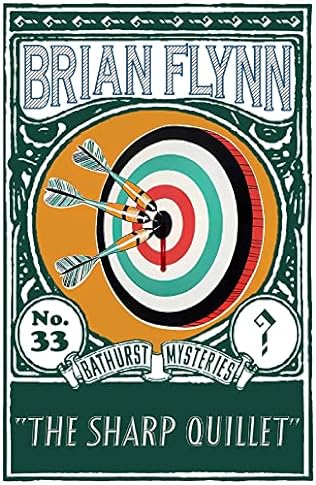A review of The Sharp Quillet by Brian Flynn – 240303
After Conspiracy at Angel had been almost universally panned by critics Brian Flynn went back to basics and starts The Sharp Quillet, the thirty-third in his Anthony Bathurst series, originally published in 1947 and reissued by Dean Street Press, with quite a bang. In the prologue there are no less than fifteen bodies, the sex worker who was murdered, the judicial murder of Arthur Rotherham Pemberton who was found guilty of the murder in both the court of first instance and in the Court of Appeal, and then the twelve jurors plus the Clerk of Court for good measure who were killed when an enemy bomb destroyed the restaurant in which they were a post-trial meal. Quite a riposte!
The focus then turns to the Bar Point-to-Point at Quiddington St Philip at which Justice Nicholas Flagon, the favourite to win the race for the third year running, is killed close to the winning post in a most unusual fashion. He has been struck by a pub dart whose tip had been dipped in curare. Flagon had received a death threat on the morning of the race and the dart bore a message referring to a sharp quillet. There are a number of plausible suspects for the murder, including some accomplished darts players, but with the police making little headway, Sir Austin Kemble calls in his A-team, Anthony Bathurst and Chief Detective Inspector MacMorran.
No sooner have the two arrived on the scene, then there is a second murder, this time of Justice Theodore Madrigal, who attending Flagon’s funeral collapsed and died instantaneously, having been struck by a poisoned dart tipped with curare. He too had received a death threat and the dart bore a similar reference to a sharp quillet. Madrigal’s demise clearly meant that there was something that connected the two judges with the killer and that those who only had an animus against Flagon were unlikely to have been the culprits. The focus of the investigation has to be recalibrated.
It is at this point that Bathurst has one of his flashes of inspiration. The working assumption had been that quillet was an archaic term for a dart. However, dredging the depths of his mind, Bathurst recollects that Shakespeare had used the phrase “sharp quillet” in both Henry the Sixth and Love’s Labour’s Lost to indicate a false accusation or a piece of trickery. As the reader has already realised, courtesy of the prologue, Flagon and Madrigal were judges who heard the Pemberton appeal and the connection is cemented when the Lord Chief Justice, Lord Fifoot, the third judge, also receives a death threat.
The pace of the book ramps up as Bathurst develops a high-risk plan that will bait the murderer to show their hand at a dinner over which Fifot is presiding, and allow the authorities to catch them red-handed. The plan goes awry and it is only two pieces of quick thinking from Bathurst that saves Fifoot’s bacon and allows the murderer to be arrested. The sense of urgency is emphasised in the final chapter by the continual reference to the time.
There is very little that is left field or genre-bending in this book. It is an enthralling and intriguing murder mystery that has a very old fashioned feel about it. It could almost have come out of the canon of Conan Doyle and Bathurst’s methodology is more a mix of intuition and elimination than deduction. While allowing the reader to establish a lead of several furlongs over the sleuths at the start with their knowledge of the trial, Flynn turns the tables in the sprint to the finishing line. While there are gentle clues here and there, the identity of the killer came as a bit of a surprise.
Flynn allows some rather large herrings to slip the net and swim off over the horizon, not least Fothergill’s wager with Flagon and the mysterious behaviour of Harcourt on the afternoon of the race. It is in keeping with the structure of the book with characters drifting in and out. One intriguing character to emerge from the shadows is Helen Repton, a female, yes female, member of the Yard who as well as being an extremely able assistant seems besotted by Bathurst who, in his way, seems to reciprocate her feelings.
This is Flynn back at his best, constructing a plot in a porting milieu that with its twists and turns never allows the reader to settle, and producing a fine piece of entertainment. The moral of the story is never meet a sleuth wearing the same clothes as you did when you murdered someone. It gets them thinking.
